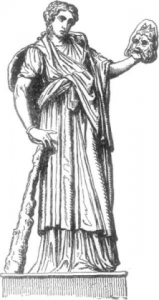Tags
 Once upon a time, we had two musicians – a cello and a violin – to provide incidental music from a play.
Once upon a time, we had two musicians – a cello and a violin – to provide incidental music from a play.
They were both young and quite good, and while called in rather at the last minute, they brought a couple of longer pieces for the beginning and end, and a handful of “musical accents” for the key moments of the play.
And I say “play”, but in truth it was to be a one-off kind of glorified staged reading, with a tight deadline and an alarmingly short time to rehearse – so the musicians arrived right in the middle of chaos. Still, we somehow managed something like a coherent rehearsal for them, to see how the music worked… 
And everything went quite well until the very last piece of music. You see, the whole thing was about Tiberius and Pilate, and ended with Pilate being thrown off a cliff in Capri – so the jaunty music didn’t suit the ending at all.
When I said so, the girl with the violin answered that it became gloomier and more dramatic within thirty bars – which I had heard for myself, but wouldn’t do. We wanted it gloomy from the start, we explained: Pilate is chucked off the cliff to gloomy and dramatic music. They only needed to start directly with the gloomy and dramatic part?
The girl glared at us. “It can’t be done,” she informed us frostily. “The beginning builds up to the ostinato. If you behead it, it makes no musical sense.”
 “Yes, of course – but you see…” and our director, who also happens to be a pianist, proceeded to explain how this was not a concert. “We need effectiveness,” she proclaimed (waving her hands, because she is a very dramatic lady). “Drama. Vividness, not musical philology!”
“Yes, of course – but you see…” and our director, who also happens to be a pianist, proceeded to explain how this was not a concert. “We need effectiveness,” she proclaimed (waving her hands, because she is a very dramatic lady). “Drama. Vividness, not musical philology!”
Fortunately, the boy with the cello, while not much liking the solution himself, saw our point and, he being the leader of the ensemble, we had our way in the end, and everything worked just right, and nobody complained about the beheaded music at the end. Well – nobody except the girl, who decided that we were a horde of hopeless barbarians, and went about with the affronted look of the very young and eager… Clearly we had sinned against Euterpe.

Yes – Melpomene carries a club… See why poor Euterpe stands no chance?
Being the one usually left to smooth the feathers our director ruffles, I tried to explain that yes – we had, but for Melpomene’s sake. “Had we provided the readings during a concert, wouldn’t you have expected us to serve the needs of the music?” I’m afraid my success was indifferent, but then I’ve been twenty and uncompromising myself. It took me time to understand that on a stage efficacy trumps most things. That historically accurate costumes or music are not always what is needed to convey an impression, an atmosphere, a mood or a meaning. That scenes, costumes, lights and music must suggest another time and another place – not educate about them. That what you can’t see from 10 meters away doesn’t matter. That what doesn’t serve your communication with the audience has no place being there. That you must capture the audience and keep them there, and wring their hearts, and make them laugh and cry, and make them see what the author and the director mean – as opposed to explaining it to them.
And if, to that end, you have to behead a piece of music and sacrifice the build-up to the ostinato, well… so be it. It can be painful at first. Then, in time, and if you stick around, you learn to be ruthless in your quest for effectiveness.

And yet… it would have been simpler, and straighter, to just play another piece, one that did not need thirty bars to get to the gloomy part.
LikeLike
One’d think so… but no: they arrived between concerts of their own, with a set little programme – and a slightly “it’s this or nothing” attitude. As I said, they were quite young, and the music truly was an eleventh hour addition. I might add, though, that the gloomy part worked wonderfully with the last scene.
LikeLiked by 1 person
Also, in general I tend to be wary of violin player of the female persuasion. They have this sort of religious fervor that sometimes makes them unreasonable, so I’m not exactly surprised at the whole story.
LikeLike